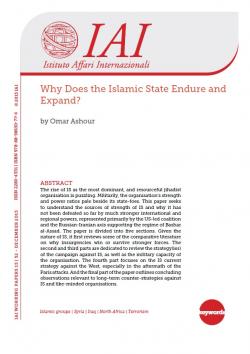Why Does the Islamic State Endure and Expand?
The rise of IS as the most dominant, and resourceful jihadist organisation is puzzling. Militarily, the organisation’s strength and power ratios pale beside its state-foes. This paper seeks to understand the sources of strength of IS and why it has not been defeated so far by much stronger international and regional powers, represented primarily by the US-led coalition and the Russian-Iranian axis supporting the regime of Bashar al-Assad. The paper is divided into five sections. Given the nature of IS, it first reviews some of the comparative literature on why insurgencies win or survive stronger forces. The second and third parts are dedicated to review the strategy(ies) of the campaign against IS, as well as the military capacity of the organisation. The fourth part focuses on the IS current strategy against the West, especially in the aftermath of the Paris attacks. And the final part of the paper outlines concluding observations relevant to long-term counter-strategies against IS and like-minded organisations.
Revised version of a paper presented at the eigth edition of the Transatlantic Security Symposium “Challenges to European Security: A Transatlantic Perspective” organised in Rome on 26 October 2015 by the Istituto Affari Internazionali (IAI).
-
Details
Roma, IAI, December 2015, 18 p. -
Issue
15|52 -
ISBN/ISSN/DOI:
978-88-98650-77-4
Introduction
1. Why weaker insurgents survive or beat stronger incumbents
2. On counter-strategy(ies): an overview
3. On IS military capacity
4. On IS strategy towards the West
5. On strategy and environment: concluding observations
References
Topic
Tag
Related content
-
Ricerca31/07/2015
Transatlantic Security Symposium - 8. ed.
leggi tutto -
Event30/07/2015
Challenges to European Security: A Transatlantic Perspective
leggi tutto



